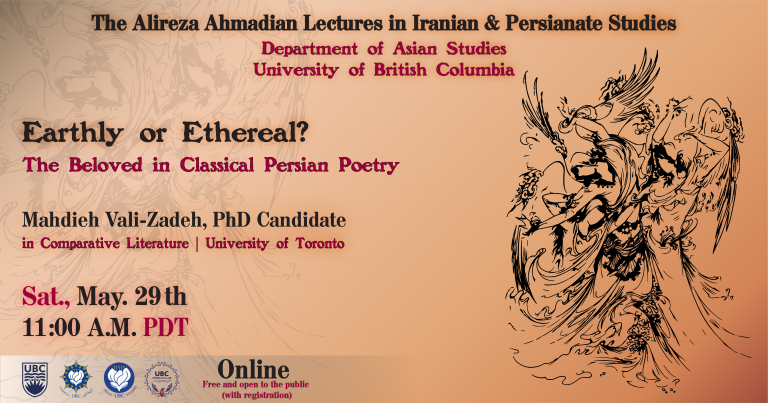

Poster design by Razman Goudarzi
زمینی یا آسمانی؟ معشوق در شعر کلاسیک فارسی
سخنران: مهدیه ولیزاده، دانشجوی دکتری ادبیات تطبیقی، دانشگاه تورنتو
به نظر میرسد که مناقشات بر سر اینکه معشوق در شعر کلاسیک فارسی ماهیتی زمینی دارد یا آسمانی هرگز پایان نخواهد یافت. طرفداران قرائت آسمانی از معشوق (که بهویژه پس از انقلاب اسلامی موردحمایت قرار گرفتند) افرادی را که قائلند که معشوق در شعر کلاسیک فارسی زمینی است، تنگنظر میدانند. از سوی دیگر، طرفداران قرائت زمینی بودن عشق در ادبیات فارسی، خوانشهای عرفانی از معشوق را خوانشهایی جزمی و منسوخ میبینند که توسط سنتگرایان رواج یافته است. در این سخنرانی ماهیت معشوق در شعر کلاسیک فارسی (با محوریت سبک عراقی) از طریق پنج رویکرد متفاوت اما مرتبط ادبیات فلسفی، ترجمهای و تطبیقی، زبانشناختی، شعری و در نهایت تاریخی بررسی و تحلیل میشود.
The event recording is now available:
It seems that the controversies over the nature of the beloved in classical Persian poetry as an earthly or ethereal phenomenon would never end. Those in favor of the celestial reading of it (who particularly enjoyed more fortune after the 1979 Islamic revolution) consider their counterparts with close affinities for an earthly beloved to be narrow-minded. The adherents of terrestrial love (who have not favored many academic voices, inside Iran due to the hegemony of the Islamicists, and in diaspora, because of the dominance of Islamic Studies in Religious Departments), though, see mystical readings dogmatic and outdated, prevailed by traditionalists. The topic gets even more complicated when one takes into account the attitudes in the medieval Muslim world toward homosexual acts and homosexual orientation, shāhid-bāzī, and thus, the gender of this beloved. The present article explores and analyzes the nature of the beloved in Persian classical poetry (with a focus on theʿirāqī style) via five different but related approaches: philosophical, translational and comparative literature, linguistic, poetic, and ultimately, historical/developmental. The study concludes that a structural and essentialist reading of the beloved in Persian classical poetry as either earthly or ethereal would create numerous problems at multiple levels, and that that the spirit of Persian classical poetry in this regard is the spirit of uncertainty, due to various reasons. The present research hopes to offer an expanded meaning of mystical love to read and interpret Persian mystical/lyrical ʿirāqī-style poetry.
Mahdieh Vali-Zadeh is a PhD candidate at the Centre for Comparative Literature of University of Toronto and a graduate of Harvard World Literature program. Mahdieh is now focused on writing her comparative dissertation, which concerns the reception of British Orientalist scholarship of Persian mysticism on the matter of the ‘self’, both individual and national, in two different but related frameworks: among the British Romantic poets of the late-eighteenth and early-nineteenth century, and the Iranian intellectuals of the early to mid-twentieth century. Her comparative Masters’ thesis on the matter of the sublime in Rumi and Wordsworth’s poetry was nominated for Best American Comparative Literature Association Master Thesis Award from York University.
Should you have any questions, please contact the Department of Asian Studies at Asian.Studies@ubc.ca.